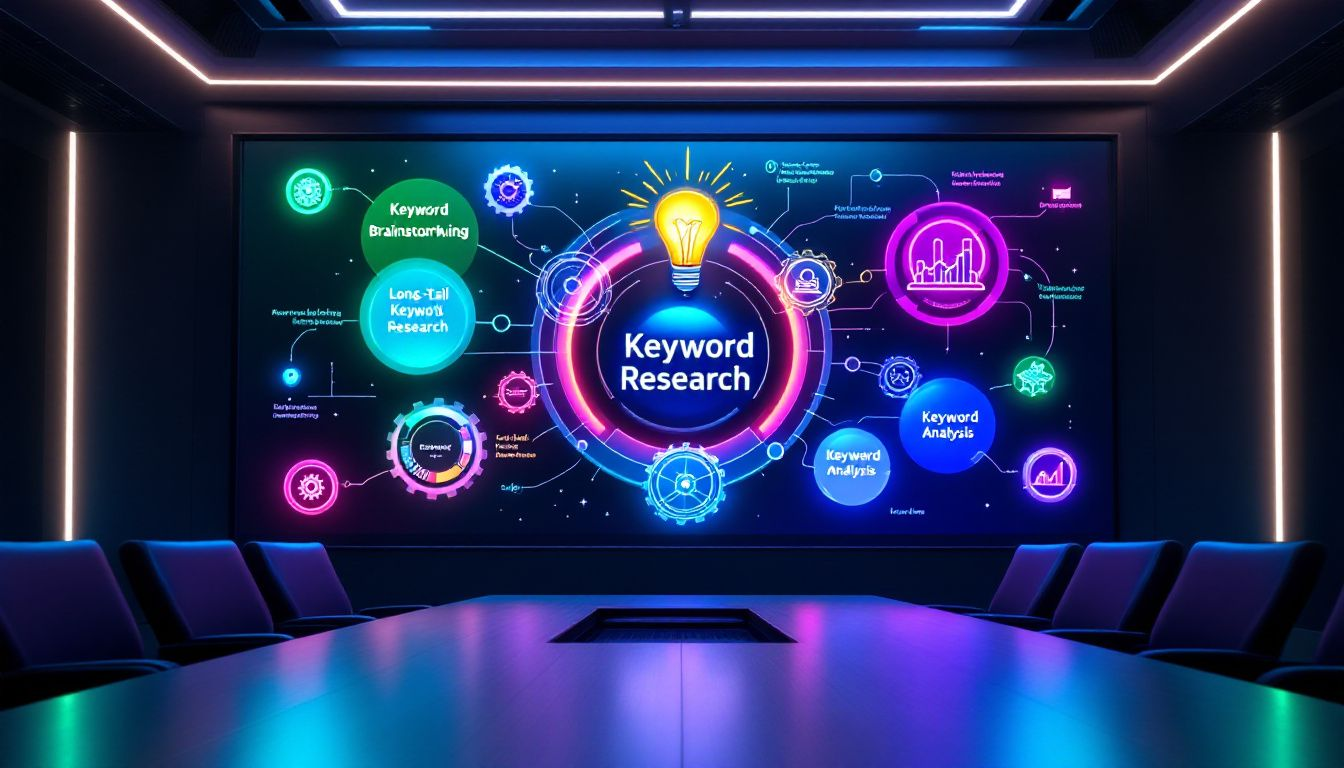Top Search Engine Optimization Tips for Effective Online Marketing

Top Search Engine Optimization Tips for Effective Online Marketing
Key Takeaways
Understanding SEO is crucial for boosting a website’s visibility and increasing organic traffic, intertwining web design, content quality, and user experience.
Keyword research, especially using long-tail keywords and specialized tools, is essential for targeting the right audience and improving search engine rankings.
Implementing on-page SEO best practices, optimizing loading speed, and ensuring mobile-friendliness significantly enhance user experience and overall site authority.
Understanding Search Engine Optimization (SEO)

To truly appreciate the power of SEO, one must first understand what it entails. SEO, or Search Engine Optimization, is a multifaceted approach aimed at enhancing a website’s visibility on search engines like Google. This involves various techniques and practices designed to improve organic traffic and search engine rankings. Think of SEO as the digital marketing glue that holds together your web design, social media marketing, and email marketing efforts.
Optimizing your website for search engines enhances accessibility for users and improves overall user experience, driving more engagement and boosting your site’s credibility.
What is SEO?
SEO is the art and science of enhancing your online presence by improving your website’s ranking on search engine results pages (SERPs). It encompasses a wide range of strategies, from incorporating relevant keywords into high-quality content to optimizing your site’s speed and mobile-friendliness. The goal is to make your website more appealing to both users and search engines, thereby driving organic traffic.
High-quality content tailored to user intent forms the bedrock of effective SEO. Integrate keywords naturally to improve readability and engagement. Focus on optimizing for human readers to ensure long-term success.
Why SEO Matters
SEO is indispensable in digital marketing, driving organic traffic to your website in a sustainable and cost-effective manner compared to paid advertising. Engaging with audiences on social media and ensuring quick website load times can significantly enhance your SEO efforts.
Fast-loading pages not only improve user satisfaction but also boost conversion rates and reduce bounce rates. Additionally, leveraging social media marketing can drive traffic to your site and improve your search engine rankings, making it an integral part of your overall SEO strategy.
Keyword Research Strategies

Keyword research is the cornerstone of any successful SEO strategy. It involves identifying the terms and phrases that potential customers use when searching for products or services like yours. This process is crucial for improving your search engine visibility and attracting targeted traffic.
Explore strategies that can help you discover the most effective keywords for your SEO efforts.
Finding the Right Keywords
Understanding your audience is the first step in finding the right keywords. Utilize customer feedback and website analytics to pinpoint high-impact keywords relevant to user interests. Monitoring competitors’ keyword usage can also provide valuable insights for content optimization.
Another effective approach is to create content that incorporates local keywords. This strategy not only targets the specific interests of your local audience but also enhances your relevance in local searches. Tools like SEMrush can help you discover specific keywords for which your pages are already ranking, allowing for targeted content improvements.
Using Keyword Tools
Effective keyword research often requires the use of specialized tools. Google Keyword Planner, SEMrush, and Ahrefs are some of the most popular options. These tools provide insights into keyword volume, competition, and performance, making it easier to identify high-impact keywords that can boost your SEO efforts.
Google Trends can help analyze the popularity of search terms over time, aiding in keyword identification and strategy development. Moz Keyword Explorer is another user-friendly option that prioritizes effective keyword metrics to help refine your SEO strategy.
Long-Tail Keywords
Long-tail keywords are specific phrases that typically consist of three to five words. These keywords tend to have lower competition and higher conversion rates, making them invaluable for targeting niche markets. By focusing on long-tail keywords, you can attract more qualified traffic and improve your overall SEO performance.
Creating content that incorporates long-tail keywords can also enhance your relevance for specific search queries, leading to better engagement and higher conversion rates. This approach is particularly effective for businesses looking to target specific niches within their market.
On-Page SEO Best Practices

On-page SEO involves optimizing individual web pages to improve their search engine rankings and drive organic traffic. This includes enhancing various elements such as title tags, meta descriptions, content, and internal links.
Let’s explore some of the best practices for on-page SEO.
Optimizing Title Tags and Meta Descriptions
Title tags and meta descriptions are critical components of on-page SEO. Crafting engaging and keyword-rich title tags can significantly influence click-through rates from search engine results. Each page should have a unique title tag that clearly describes its content to both users and search engines.
Similarly, well-crafted meta descriptions can lead to higher click-through rates by providing a compelling summary of what users can expect from the page. Incorporating relevant keywords into these elements can further enhance your search engine visibility and user engagement.
Content Optimization
High-quality content is the backbone of effective SEO. By integrating keywords naturally into your content, you can improve both readability and SEO performance. This approach ensures that your content is tailored to the user’s intent, enhancing engagement and driving organic traffic.
Beyond keywords, it’s essential to focus on creating valuable and relevant content that addresses your audience’s needs. This not only boosts your SEO rankings but also establishes your authority and credibility in your niche.
Internal Linking
Internal linking is a powerful on-page SEO technique that helps guide users to related content on your site. This improves user experience and promotes deeper engagement with your website’s content. Strategic use of internal links can enhance site navigation, making it easier for visitors to find information efficiently.
Effective internal linking also aids search engines in understanding the relationship between pages, improving overall site navigation and SEO rankings. This practice is essential for ensuring that your website is both user-friendly and search engine-friendly.
Technical SEO Essentials

Technical SEO focuses on optimizing the backend aspects of your website to ensure that search engines can effectively crawl and index your site. This includes elements like site speed, mobile-friendliness, and proper use of XML sitemaps and robots.txt files.
Explore these crucial technical SEO elements.
Site Speed and Performance
Site speed is a critical factor in SEO and user experience. Users expect a website to load in under six seconds, and any delays can significantly increase bounce rates. Tools like Google PageSpeed Insights can provide valuable insights into your site’s speed and suggest improvements.
Utilizing a content distribution network (CDN) can enhance site speed by minimizing the distance data must travel to reach the user. This ensures a faster and more seamless user experience, which can positively impact your SEO rankings and development services.
Mobile-Friendliness
In today’s mobile-first world, having a mobile-friendly website is essential for SEO. A responsive website design ensures that your content displays correctly on various devices, improving user engagement and satisfaction. Google prioritizes mobile-first indexing, meaning the mobile version of your site is predominantly used for ranking. Web designers play a crucial role in creating these responsive designs.
Ensuring your site is responsive and mobile-friendly is crucial for maintaining visibility in search results and providing a positive user experience. This can significantly impact your site’s SEO performance and overall success.
XML Sitemaps and Robots.txt
XML sitemaps and robots.txt files play vital roles in technical SEO. An XML sitemap acts as a guide for search engines, helping them understand the structure and content of your website for better indexing. This ensures that all relevant pages are discovered and indexed correctly.
Similarly, a robots.txt file is essential for managing which sections of your site should or shouldn’t be crawled by search engines. Proper use of these files can influence your site’s indexing and overall SEO performance.
Off-Page SEO Techniques

Off-page SEO focuses on enhancing your site’s authority and visibility through external factors. This includes strategies like link building and social media marketing, which are vital for improving search engine rankings and driving traffic.
Let’s explore some effective off-page SEO techniques.
Link Building
Link building is a crucial aspect of off-page SEO. Acquiring backlinks from high-authority sites significantly influences your search engine rankings and credibility. Effective link building requires obtaining backlinks from authoritative websites, which can provide a substantial boost to your SEO efforts.
These backlinks act as endorsements for your site, signaling to search engines that your content is valuable and trustworthy. This, in turn, can enhance your site’s visibility and search engine performance.
Social Media Marketing
Social media marketing is an integral part of a comprehensive online marketing strategy for a marketing agency. It plays a crucial role in driving traffic to your website and enhancing your SEO efforts. By engaging with audiences on social media platforms, you can increase your site’s visibility and attract more visitors.
Effective social media marketing can also enhance your online reputation and brand recognition, contributing to better SEO performance and overall digital marketing success.
Online Reputation Management
Online reputation management is essential for maintaining a positive image and driving traffic to your website. Encouraging positive reviews can enhance a business’s online reputation and influence local search rankings. These reviews act as social proof, boosting your credibility and attracting more customers.
Managing your online reputation involves actively monitoring and responding to reviews, ensuring that your business is perceived positively by potential customers. This can have a significant impact on your SEO performance and overall business success.
Local SEO Strategies
Local SEO is particularly important for small businesses looking to capture customers in their vicinity. By implementing local SEO techniques, you can enhance your business’s visibility in local search results and attract nearby customers.
Let’s explore some effective local SEO strategies in Lafayette LA.
Google My Business Optimization
Optimizing your Google My Business profile is a critical step in local SEO. Claiming and updating your business profile ensures that accurate and engaging information is displayed to potential customers, which can significantly improve local search rankings. Features like Google Posts allow you to share updates and promotions directly with users, enhancing your online presence and engagement.
A well-optimized Google My Business profile includes essential details such as operating hours, location, and contact information. This not only attracts more potential customers but also boosts your business’s credibility and visibility in local searches, including professional services.
Local Citations and Reviews
Maintaining consistent NAP (Name, Address, Phone) information across various online directories is crucial for local SEO success. Discrepancies in this data can negatively impact your local search rankings, making it essential to ensure accuracy across all platforms.
Encouraging and managing reviews on sites like Yelp and Facebook can enhance your online reputation and improve local search visibility. Positive reviews act as social proof, attracting more local customers and boosting your business’s credibility among existing customers and support services.
Localized Content
Creating localized content is essential for engaging your local audience and meeting their specific needs. By addressing local community interests and events in your content, including print ads, you can position your business as a local authority, enhancing your visibility in local searches.
Localized content not only improves your relevance in local searches but also fosters a stronger connection with your audience. This approach can lead to higher engagement and better SEO performance, ultimately driving more local traffic to your site.
Measuring and Analyzing SEO Performance
Evaluating your SEO performance is crucial for understanding the effectiveness of your strategies and initiatives. By monitoring key metrics such as organic traffic and bounce rates, you can gain insights into how well your website ranks for relevant keywords and attracts visitors.
Let’s explore some tools and techniques for measuring SEO performance.
Using Google Analytics
Google Analytics is an invaluable tool for tracking key SEO metrics. It enables users to monitor organic sessions, track visitor interactions, and evaluate the effectiveness of SEO strategies over specific timeframes. Understanding user behavior through Google Analytics can lead to informed decision-making and improvements in your SEO efforts.
Google Analytics 4, the latest version, allows users to track visitor interactions as ‘events’, providing comprehensive insights into SEO performance. This data can help you identify areas for improvement and optimize your strategies accordingly.
SEO Reporting Tools
SEO reporting tools like Moz, SEMrush, and Ahrefs are essential for comprehensive SEO performance monitoring. These tools provide insights into keyword rankings, site authority, and backlink profiles, helping you refine your SEO strategies and improve your online performance.
Using these tools allows you to track and analyze key metrics, ensuring that your SEO efforts are aligned with your business goals. Effective SEO reporting is crucial for identifying strengths and weaknesses in your strategy and making data-driven adjustments.
Adjusting Strategies Based on Data
Analyzing performance data from SEO tools can reveal valuable insights, informing necessary adjustments to your strategies. Identifying underperforming content allows for updates or re-optimization to enhance rankings and improve user engagement.
Refining your SEO strategies based on data ensures that your efforts are continuously aligned with your business goals. This iterative approach allows for ongoing improvement and better results over time.
Common SEO Mistakes to Avoid
Avoiding common SEO mistakes is essential for maintaining your site’s visibility and ranking. Frequent errors can significantly lower your search engine rankings and user engagement, making it crucial to identify and rectify them.
Explore common SEO pitfalls and how to avoid them.
Keyword Stuffing
Keyword stuffing refers to the overuse of keywords in your content in an attempt to manipulate search engine rankings. This practice can lead to diminished readability and may result in penalties from Google. Instead, focus on creating high-quality, relevant content that naturally incorporates a variety of keywords without excessive repetition.
Overloading a webpage with keywords not only harms content quality but also negatively impacts user experience. By avoiding keyword stuffing, you can ensure that your content remains engaging and valuable to your audience.
Duplicate Content
Duplicate content occurs when identical or substantially similar content appears on multiple web pages. This can confuse search engines and hurt your page rankings, making it essential to resolve any duplicate content issues. Ensuring each page has unique and valuable content helps maintain page authority and improves overall SEO performance.
Duplicate content can dilute link equity, as search engines struggle to determine which version should rank. By creating original content for each page, you can enhance your site’s credibility and search engine visibility.
Ignoring User Experience
User experience (UX) plays a significant role in SEO. Search engines prioritize sites that provide a positive experience to users, making UX an essential factor in your SEO strategy. Improving user experience through metrics tracking can lead to lower bounce rates and higher search rankings.
Implementing changes based on user behavior data can enhance site navigation, content quality, and overall user satisfaction. By focusing on UX, graphic design, and custom websites, your development team can ensure that your website not only ranks well but also engages and retains visitors effectively.
Summary
In summary, effective SEO is a multifaceted approach that integrates various strategies to improve your website’s visibility and drive organic traffic. From keyword research and on-page optimization to technical SEO and off-page techniques, each element plays a crucial role in your overall SEO success. By avoiding common mistakes and continuously refining your strategies based on data, you can achieve lasting results.
Remember, SEO is not a one-time effort but an ongoing process that requires dedication and adaptability. By implementing the strategies discussed in this guide, you can enhance your online presence, engage your audience, and ultimately achieve your business goals. Stay committed, keep learning, and watch your website climb the search engine rankings.
Frequently Asked Questions
What is SEO and why is it important?
SEO, or Search Engine Optimization, is crucial for boosting your website's visibility in search engines, driving organic traffic, and enhancing user engagement. By implementing effective SEO strategies, you can significantly improve your online presence and attract more visitors to your site!
How can I find the right keywords for my SEO strategy?
To find the right keywords for your SEO strategy, leverage tools like Google Keyword Planner and SEMrush, analyze customer feedback, and keep an eye on your competitors. This focused approach will empower you to attract the right audience and boost your online presence!
What are long-tail keywords and why should I use them?
Long-tail keywords are specific phrases that help you target niche markets with less competition, leading to higher conversion rates. Embrace them to attract more qualified traffic and drive your success!
Why is mobile-friendliness important for SEO?
Mobile-friendliness is essential for SEO because search engines favor mobile-first indexing, meaning your mobile site plays a key role in rankings. Prioritizing a responsive design not only boosts your visibility but also enhances user experience, leading to better engagement and success.
How can social media marketing enhance my SEO efforts?
Social media marketing can significantly boost your SEO by driving traffic to your website and increasing visibility. By engaging with your audience on social platforms, you not only attract more visitors but also enhance your site's authority.